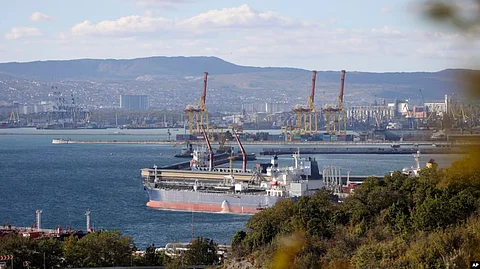
- Home
- न्यूजग्राम
- NewsGram USA
- India
- World
- Politics
- Entertainment
- Culture
- Lifestyle
- Economy
- Sports
- Sp. Coverage
- Misc.
- NewsGram Exclusive
- Jobs / Internships

The European Union finally managed to approve a new round of sanctions on Russia -- as well as Belarus -- before going on its traditional all-August recess, eventually overcoming a Slovak veto in a saga that has dragged on for two months.
But perhaps the bigger story is that the bloc managed to agree to lower the Russian oil cap substantially, and do so on its own without agreement from the United States and other G7 nations -- who can join at a later stage -- a sign of a more confident and independent EU on the world stage.
When the oil price cap was first agreed on a G7-level in December 2022 it was meant as a sort of global compromise over an EU ban on services to transport Russian oil. The idea was to decrease Russian trade revenues but at the same time allow third countries, notably in the poorer global south, to still get access to the product in order to avoid shortages.
The cap was set at $60 per barrel and even though it should have been reviewed every three months to reflect fluctuations in world oil prices, it has remained at that level for the last two and half years.
The EU finally decided to push for a lowering to $45 per barrel when it presented its new round of sanctions, its 18th since the full-scale invasion of Ukraine in February 2022, in June.
Taking the proposal to the G7 summit in Canada last month, the bloc tried and failed to secure a deal with the United States resisting as oil prices surged after Israeli and American attacks on Iran's nuclear facilities.
Presumed dead at first, several key EU member states such as Germany and France as well as the European Commission still aimed at resuscitating the new cap and tried to convince Cyprus, Greece, and Malta - countries with considerable maritime services sectors – to agree on EU-only measures instead.
Eventually the trio got onboard with lowering the cap to $47.6 per barrel, 15 percent lower than the average market price of Russian crude oil. What got them all onboard was the promise of a “dynamic review” of the cap, meaning that it should be reviewed on a regular basis.
The key thing to look out for now is if other G7 nations follow suit.
EU officials RFE/RL has spoken to hope that the United Kingdom, another significant maritime insurer, will join and that this will eventually prompt the United States to get onboard as well.
The other big talking point was the Slovak sanctions veto threat.
What made this veto special was the linkage Bratislava made to give thumbs up to the restrictive measures, which the Central European country in principle had nothing against.
What worried Slovakia was a separate proposal by the European Commission presented earlier this year to phase out Russian energy imports into the bloc by the end of 2027.
The proposal, named "RePowerEU," is not a traditional sanctions move which requires unanimity but an EU internal market regulation that can be adopted via a qualified majority of 55 percent of the member states representing 65 percent of the total EU population voting in favor. It would, in other words, be possible for Brussels to circumvent Bratislava entirely.
In the end, Fico lifted his veto threat late on July 17, paving the way for a stop to Russian gas flow to his country by January 1, 2028. But he did secure an improved “crisis mechanism” in the regulation that can be triggered in the case of high energy prices and gas shortages. So Russian gas could potentially still very much enter the bloc.
He also got assurances that EU funds can be used to compensate for high gas prices, with the European Commission earlier this week presenting a proposal for a new 2 trillion-euro budget.
The European Commission, with its arrays of well-paid legal minds, also promised Fico that it will assist Slovakia in the case of any future arbitration over a breach of contract with the Russian energy giant Gazprom, which has valid contracts with Bratislava until 2034.
[RFE/RL/VP]
